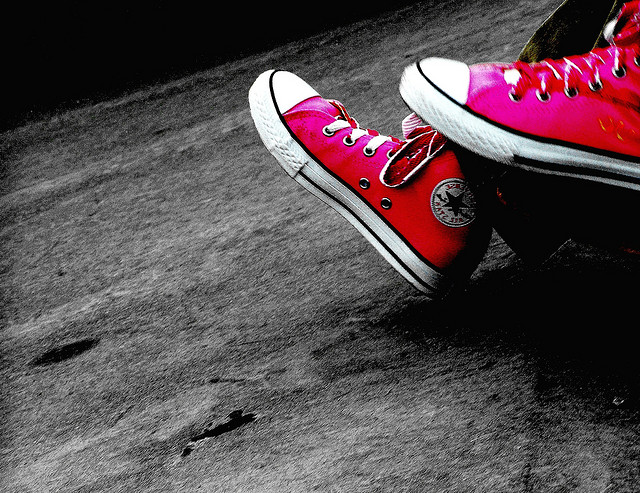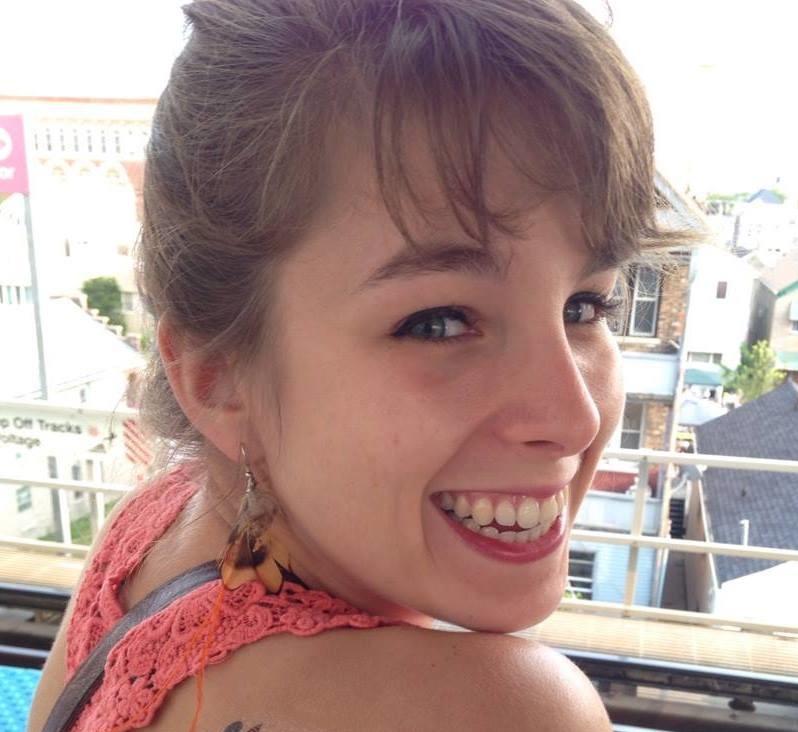Essay by Lydia Buchanan
Laugh at the Cute Girl—She’ll Laugh Harder

I don’t look like much. Four-foot-eleven, wearing little to no make-up, I’m not impressive. My face is not mature or intimidating or wise or authoritative or beautiful. At best, I’m cute—a cute assistant to make the adult world chuckle. Maybe sometimes I’m ”bold,” maybe even “artsy,” but that’s because I’m 22, have a Napoleon complex, and struggle to find clothes that fit both my employment and little-girl size.
Apart from my clothes, I do my job well. Clients, attorneys, and agents assume I’m a Real Adult when we talk on the phone or write letters. Email is the best protection: brief, professional, indirect. No faces, no squeaky telephone voice to give away my secret. My electronic signature legitimizes me. Blinded, they accept me as their own.
The awkward part is when they come into my office and only glance at the girl-in-the-front. She must be a high school intern or professional phone answerer, they think. When I stop them on their way past, realization sets in: They’ve been asking legal advice of a twelve-year-old. They blink, then simper. Their eyes soften in condescension, then toughen as professional turns into confused, docile, sweet.
I don’t want sweet. I’m not sweet. I want to be a person. Honey isn’t a person.
It’s the same when I write. I’m insufficient. Classrooms of Poets and Essayists and Serious Science Fiction Writers read my blood, my soul—and they chuckle. They titter, they smirk. I’m clever. I can use words like a knife and cut my enemies down with a jab of punctuation. But in the end, it’s a pocketknife, a cute, vicious story. I’m the office girl, there for aesthetics. I entertain.
Sometimes, these classrooms make me fear that darkness is not in me, not in the way it lives in other writers. It naps in their souls, slips through their dreams and their wardrobes until they can spin out tales and couplets of angst. And they do like me, in the way the fruit world embraces tomatoes—technically one of their own, but not invited to join the fruit salad.
There are too many strikes against me: I like Taylor Swift. I love the Smurfs. I didn’t like The Tree of Life. (It was depressing, and there were too many weird camera angles.) I drink coffee black because my mother is German and raised me on it, not because I think it matches the color of my mood. I don’t love philosophy or long debates on moral conundrums or Flannery O’Connor—and it’s not because I don’t understand what she is trying to do or because I’m unreligious or because I’m not a woman. I am a woman. It’s because as important as her work is, I don’t really like the grotesque. I’m okay with not liking Flannery O’Connor, but it’s a secret I don’t whisper outside my head, because if I tell the other writers in these classrooms, it just proves I am too white and female and cute to understand darkness. Too naïve to know what it is to look inside and see something awful. As if tomato seeds don’t rot.
They’re wrong. I know darkness. I’ve had my heart broken. Yes, by a boy once, but also by the biggest boy in my life: my father, in a bang, and then constant whimpers. And by my mother and sisters, my brother, my friends, by time and all the authority figures the world has ever imposed on me in their insufficient humanity. Even my cat can break my heart, with rejection that stings sharp because she should be the safest to love. To live is to see that sometimes love is not enough to turn the darkness off.
When I’m afraid to write, it’s because my words don’t usually wear black, and people forget that stories aren’t like water, where only the dark parts are deep. Sometimes, I want to smack these people: Don’t forget to think because I made you laugh. Comedies are only funny because they’re backhanded ways of stating the unpleasant truth. But if I march over and smack someone, it will be funny all over again. I’m not big enough to bitch-slap anyone well.
I don’t know how to be bigger without losing myself. I don’t like pantsuits, and pantsuits don’t like me. I would wear leggings and a sports bra all day if I could, if women wouldn’t look at me and assume my favorite color was pink and that my favorite store was the Limited Too and my magnum opus was a collection of love poems in the style of Taylor Swift.
I could write as if it hurt to think of the sun. As if every word was inked in my tears and I hadn’t laughed since Polaroid cameras were there to snap up my dimples. But that’s called dishonesty, and it hurts worse than being disregarded. I love the sun.
I want to be the middle child of noon and midnight. Six o’clock. Sunrise, sunset. Charming, beautiful, accessible—and so real it hurts to look directly at me.
Art Information
- "Edgy Pink" © © D. Sharon Pruitt, Pink Sherbet Photography; Creative Commons license.
 Lydia Buchanan is currently working on her MFA in creative nonfiction at the University of North Carolina-Wilmington. Before she moved across the Mason Dixon Line, Lydia was living in Chicago, working as an assistant to some men in suits who had passed the bar exam. Before that, she graduated with a degree in literature and political science from Wheaton College in Illinois—and before that, she spent her childhood catching hermit crabs and eating sand in Falmouth, Massachusetts on Cape Cod. Lydia is the third of five children, if you count the family cat as a sibling, which she does.
Lydia Buchanan is currently working on her MFA in creative nonfiction at the University of North Carolina-Wilmington. Before she moved across the Mason Dixon Line, Lydia was living in Chicago, working as an assistant to some men in suits who had passed the bar exam. Before that, she graduated with a degree in literature and political science from Wheaton College in Illinois—and before that, she spent her childhood catching hermit crabs and eating sand in Falmouth, Massachusetts on Cape Cod. Lydia is the third of five children, if you count the family cat as a sibling, which she does.
